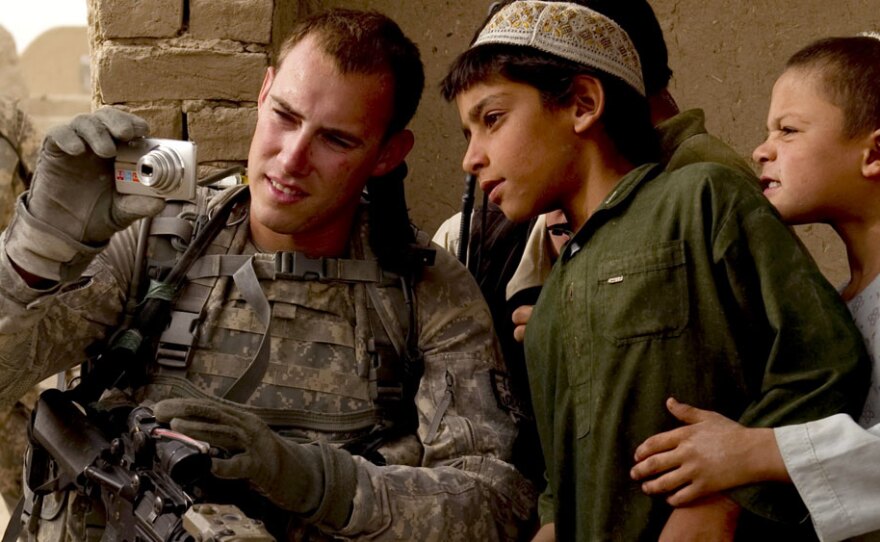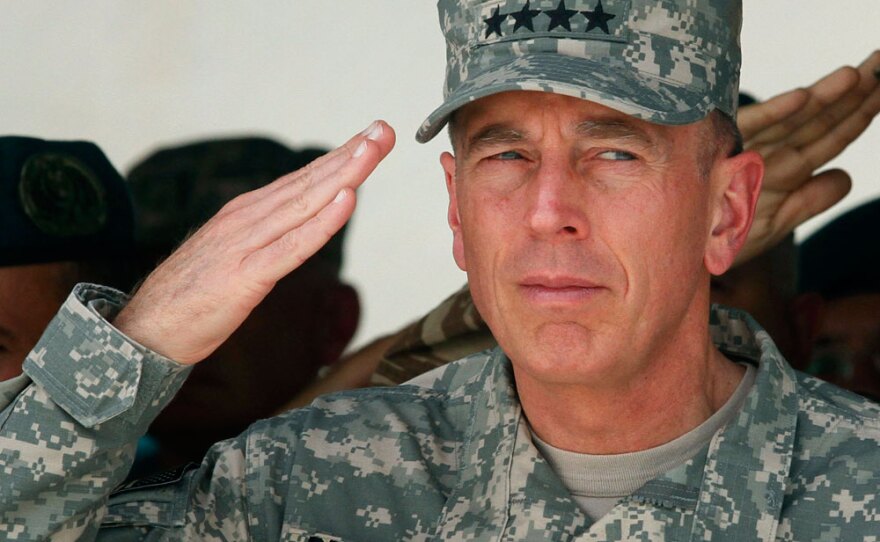There has been an almost unending run of bad news out of Afghanistan, including new peaks in casualty figures for U.S. troops. Gen. David Petraeus, the top commander for the war effort, is currently on a media mission to convince the American people to stick with President Obama's strategy there a bit longer nonetheless.
He's likely to succeed.
"I think our job is … to show those in Washington that there is progress being made," Petraeus said on NBC Nightly News on Thursday. "We've got to build on the progress that has been established so far." He's due on NBC's Meet the Press this Sunday, CBS-TV next Friday and ABC-TV by the end of the month.

Afghanistan -- if you date the start of the Vietnam War from the 1964 Gulf of Tonkin Resolution -- is already America's longest war. But public opinion surveys show that U.S. support for the war, while hardly overwhelming, has remained steadfast.
A USA Today/Gallup poll released last week showed that opposition to the war had reached a new high -- 43 percent. But doubters were still outnumbered by the 52 percent who expressed support.
Other surveys present a similar case. There's been only a slow erosion of support, despite a steady drumbeat of bad news, including losses in the field, the ouster of Gen. Stanley McChrystal, a series of withdrawals by allies -- most recently the Dutch -- and the embarrassing classified document dump orchestrated by WikiLeaks.
People don't, by and large, believe the war is going well, but they continue to support its goals. "I follow public opinion for a living, and I haven't seen anything dramatic," says Frank Newport, Gallup's editor-in-chief. "No sharp ups and no sharp downs."
Remembering The Towers
Michael O'Hanlon, director of foreign policy research at the Brookings Institution, says the American people have shown more patience for Obama's strategy -- which has not yet been fully implemented -- than "the chattering class" in Washington.
"We talk about the American people losing patience like it's a law of nature," O'Hanlon says. "If they have basic confidence in the strategy that's being followed, they will tough it out for a considerable amount of time before conceding defeat."
No sharp ups and no sharp downs.
There are a number of reasons for this. One is that U.S. casualties in Afghanistan, while on the rise, remain well below levels seen in Iraq or previous conflicts such as Korea and Vietnam.
Another is that the original trigger for this war -- the attacks of Sept. 11, 2001 -- retains considerable resonance. "There's a sense in the public that if you leave and the Taliban returns, there could be consequences here," says Rajan Menon, a political scientist at City College of New York. "The fact is that critics of the war, myself included, have to do a much better job of answering the question the war has raised -- how are you going to prevent the consequences that a rapid American withdrawal would create?"
Playing Against His Base
The chorus of critics is rising, however -- notably in Congress, where there was considerable opposition last month to the latest bill funding the war. But, as O'Hanlon points out, roughly 100 restive House Democrats were far from enough to overcome the remaining support for the president's top national security priority among members his own party -- combined, as that support was, with firmer backing among Republicans.
"The interesting thing about Obama's support for the war and his policy is that it's strongest among those who disagree with him on almost everything else," says Peter A. Brown, assistant director of the Quinnipiac University Polling Institute. "His support is much stronger among Republicans and independents than among Democrats."

This presents a paradox for a president who gained initial stature as a national candidate, particularly in the Democratic primaries in 2008, as an anti-war -- or at least anti-Iraq war -- candidate. Even if the American people as a whole remain more or less supportive of his Afghanistan strategy, Obama risks losing traction among some of his core supporters.
"Opposition is strongest in President Obama's base, whereas support for the Iraq war was strongest in President Bush's base," says Peter Feaver, an academic expert on public opinion about war at Duke University, who served in the George W. Bush administration.
"From a political standpoint, the president hears that opposition more loudly, feels it more acutely, than President Bush did," Feaver says.
Navigating Potential Headwinds
Obama does appear to be more responsive to his critics than Bush, who proceeded with the so-called surge of troops in Iraq under Petraeus despite much louder political opposition to that war in 2006.
Intraparty politics help explain why Petraeus, while counseling patience, continues to emphasize that Obama's proposed troop withdrawal from Afghanistan next July is still part of the plan. But it's also possible that the White House has calculated that the public as a whole, while still more supportive than not, will not stay resolute forever.
The number of U.S. troops killed in the war may be comparatively low by historical standards but is not negligible. "When we were at this stage of casualties in Iraq, in 2003 or 2004, there were tons and tons of stories about whether public opinion would collapse," Feaver says. "The costs are high enough for the American public to turn against the war if they perceive it as lost, even at this level of casualties."
Not Topping The Agenda
It's safe to say that Afghanistan is not foremost in the minds of most Americans. A Gallup poll released Friday showed that only 2 percent of Americans named the war as the top problem facing the country -- far lower than jobs and the economy. It has never achieved nearly the "top-of-mind salience" that the Iraq war did a few years ago, Gallup's Newport says.
Menon, the CCNY political scientist, says it may take a singular event -- some version of Vietnam's Tet Offensive -- to turn the bulk of U.S. opinion against the war. "The tipping point could be some dramatic thing that really crystallizes in one fell swoop all the problems we are up against," he says.
Even a supporter of Obama's strategy such as O'Hanlon suggests that when and if American public opinion turns against the war in Afghanistan, it's likely to be "beyond repair."
But that hasn't happened yet. "In order to do that, the American people have to be dissuaded from the idea that this is necessary to prevent another 9/11," says John Mueller, an Ohio State University political scientist and national security scholar. "I don't see that happening, for the time being at least."
Copyright 2022 NPR. To see more, visit https://www.npr.org. 9(MDAzMjM2NDYzMDEyMzc1Njk5NjAxNzY3OQ001))






